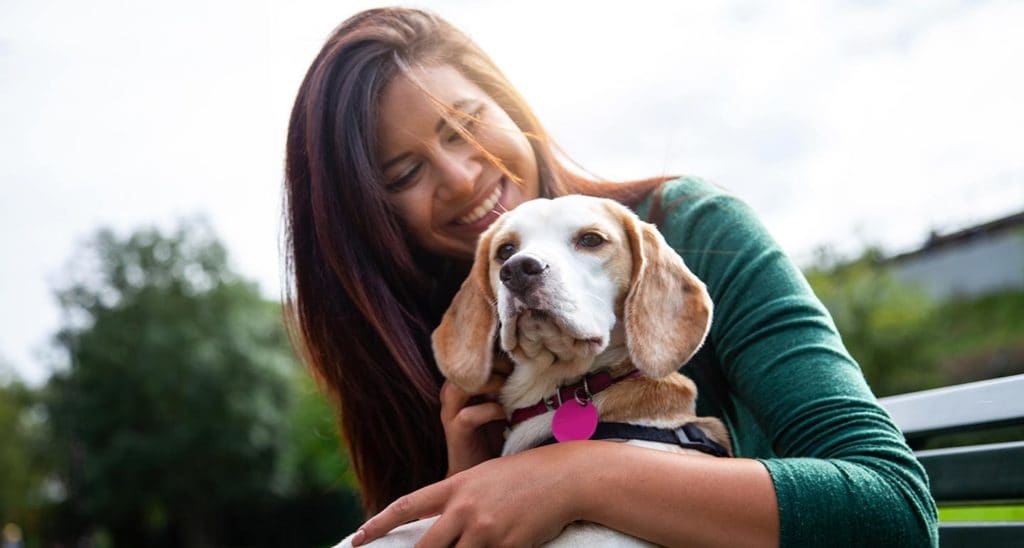Many prospective pet parents never consider the benefits of adopting a senior dog. But for Nealy Bowden, the choice was clear.
After buying her first home in August 2017, Bowden found Howdy, a three-legged 12-year-old Pitbull, on the website of the Animal Welfare Society of West Kennebunk, Maine. She arrived at the shelter to meet Howdy and quickly fell in love with him. The next day, Bowden adopted Howdy.
“I didn’t want that sweet dog to have to stay another night in the shelter,” she told the ASPCA.
Howdy fit right into the family, easily getting along with Newton. He gained weight, bonded with Newton, and learned how to walk on a leash and wait for his meals. And despite Howdy’s older age, Nealy discovered that he loves to hike and socialize with other dogs.
“When you adopt a senior pet, you’re not only welcoming a lifetime of love into your home—you’re also saving a precious life,” says Kelly DiCicco, manager of adoptions promotions at the ASPCA in New York. “Many shelters have older dogs in their care, but a common desire to adopt young pups often leaves the seniors overlooked.”
Puppies are usually the more commonly sought-after pets, but for many potential pet parents, older dogs may actually be a better fit. As with any new pet, there are both challenges and benefits to adopting a senior dog. Is an older dog right for you? Find out the pros and cons of adding a senior pet to your family.
The Benefits of Adopting a Senior Dog
You’ll Know More About Them
“When adopting from a shelter, you often have the opportunity to learn more about the animal you are considering bringing home, including their background, energy level and how they might get along with other animals in the house,” DiCicco says. “Since senior pets are fully grown, you’ll be immediately aware of important information like personality type and grooming requirements, making it easier to choose the perfect pet for your family. You’ll also know their full-grown size and activity level, and how that might affect your lifestyle.”
Knowledge of the type of dog you are adopting is hugely beneficial when considering how a dog can fit into your life. In addition to knowing the exercise, grooming, health and social needs of prospective senior pets, you can often get a better sense of their individuality.
“Their behavior is more predictable because their personalities are already well developed,” DiCicco says. “You’ll know things like whether your senior dog is outgoing or shy, if he loves to go on adventures or prefers to nap on the couch, and other behavioral traits that make your senior dog who he is.”
They Tend to Require Less Training
Grace Anne Mengel, VMD, assistant professor of clinical primary care medicine at the University of Pennsylvania School of Veterinary Medicine, says that puppies usually require a lot more work than an older dog in terms of potty training and behavior modification. An older dog has often already received training and matured with age.
“Many are already housetrained and have often grown out of habits that a puppy has not, including chewing, destructive behavior and accidents in the house,” DiCicco says. “Grown-up pets don’t require the constant monitoring and training that puppies and kittens do. It’s nice to adopt a dog who likely knows what ‘no’ means and who can comfortably be left alone in a house or apartment—because they’ve got years of experience!”
Lower Energy and Less Exercise Needs
“Depending on lifestyle, the exercise needs of an older dog would be potentially less,” Dr. Mengel says, noting that older dogs tend to be a little calmer.
“On one hand, activity for an older dog is good because, as the physical therapists say, ‘motion is lotion,’” she says. “So, they still need walks and interaction because interaction is good mentally and walks keep them moving. But where a younger dog might need to go out for a run or off-leash time, an older dog might be happy going for a walk around the neighborhood in the morning and at night and they’re happy to chill out during the day.”
Since some older dogs suffer from arthritis, activity level in an older dog will vary based on health condition, Dr. Mengel says. It is important to pay attention to the signs the dog provides to you as well. When they are indicating to you that they are tired, turn around or go for shorter walks, Dr. Mengel says.
Age Can Be a State of Mind
Typical veterinary guidelines consider 7 years old “senior” in dog years, although individual dog breeds age at a different pace than others. Smaller dogs tend to live longer, with Dachshunds or Jack Russell Terriers potentially living into their late teens and even early twenties, according to Mengel. A larger dog’s life expectancy, on the other hand, will be more in the 10 to 15 year range.
“Size might indicate chances of lifespan, and there are always exceptions,” she says.
So, senior status really varies from dog to dog—it is both breed-dependent and individual-dependent, Dr. Mengel says. The 7-year mark, she explains, is more of an indicator to pet parents and veterinarians that dogs age 7 and up should have bloodwork taken regularly to spot early signs of kidney disease, nutritional deficiencies and other illnesses.
That means that the age of a dog isn’t a great indicator of how that particular pet will behave.
“I’ve seen dogs that are 8 and look like they’re 13 and dogs that are 13 and look like they’re 2, so it’s definitely not a hard and fast number. Let the dog tell you,” Dr. Mengel says. “Age is a state of mind.”
Challenges of Adopting an Older Dog
Clearly, there are plenty of reasons to adopt an older dog. But common challenges can arise with older animals, too. Before you decide to bring a senior pet into your life, make sure you’re aware of the issues that sometimes come with older dogs.
Separation Anxiety or Longer Adjustment Period
Puppies are generally pliable creatures; everything is new to them, after all. But older dogs may have settled into a routine—and it can sometimes take them a little while to adjust to new circumstances.
“They might have a longer adjustment period because they have a different routine. It may take them a little bit more time to adjust, but by the same token they’re quieter,” Dr. Mengel says. “Some dogs might be OK going to a new home, while older dogs might have a harder adjustment.”
For example, she says, an older dog who had a previous parent who stayed home all day could suffer from separation anxiety if you leave them home alone.
“While every dog is an individual, it generally takes between two weeks and three months for dogs to settle into a new environment,” DiCicco says.
To help smooth the transition, DiCicco recommends developing a routine early on.
“Give your new pet time, space and the emotional support he needs to settle in before introducing new people or taking them to scary new places,” she says.
Health Problems
“The senior dog you adopt could be a healthy old dog and not need a lot of extra vet care,” Dr. Mengel says, “but some of them might get some health problems, from simple things like a urinary tract infection to other things like kidney disease and cancer and chronic arthritis.”
Pet parents of senior dogs should be prepared to manage those issues, which can involve providing medication and regular vet visits and tests. Physical therapy and acupuncture can also help senior dogs who are in arthritic pain to improve their quality of life, Mengel says.
Find out more about holistic therapy options for older dogs.
Other health problems to watch for in a senior dog include urinary or fecal incontinence and showing evidence of hearing and vision loss, which could lead to them having a hard time adjusting to their new environments, Dr. Mengel says. She adds that canine cognitive disfunction, or dog dementia, affects some senior dogs, which can manifest as confusion or anxiety in your pet.
“Understanding the changes your dog is undergoing can help you compassionately and effectively set them up for success,” DiCicco says.
Wariness Around Children or Younger Dogs
It is important to be aware that senior dogs’ physical ailments may lead them to be more reactive around lively children and pets—so pay attention to the signals.
“Think about active children because, if the dog is in a little pain or if he doesn’t see or hear as well, then he could be startled more easily by children,” Mengel says. “Sometimes dogs get put into situations that are not fair where they are expected to be calm and not reactive, but then another dog or child comes along and the dog bites or acts out. You have to go into different situations carefully and watch for dog body language. Often they will give signals before they react to something, like a tail tuck, or the ears go down, or drooping head.”
That’s not to say that all older dogs are unsafe around kids and other pets, of course. It is possible for senior dogs to become acclimated to a new environment—and yes, you can teach an older dog new tricks (and behaviors).
“A behaviorist can help you change your verbal cues to hand signals if your dog has lost his hearing and help you adjust your training for any physical impairments your dog may have developed,” DiCicco says.
Mobility Challenges
“A big consideration is the size of dog and how you are going to help the dog if they lose mobility,” Dr. Mengel says. “You need to think about how you are going to be able to help this dog if they’re having trouble getting up.”
Imagine, for example, that you need to drive your dog to the vet—but they’re unable to get in the car by themselves. Or what if the steps to your front lawn become unnavigable to your senior pup? A smaller dog will be easier to pick up and carry when necessary. Larger dogs may need more creative solutions, Dr. Mengel says.
“As an older dog owner, you have to be adaptable and creative on how to live with them and make their life doable,” Dr. Mengel says.
Pet parents can change the routine of an older dog to make it more convenient for the dog to go outside, such as moving the dog to a lower floor in the home to avoid stairs. Dr. Mengel also recommends purchasing pet ramps and easy-harnesses to make their lives easier if they lose mobility due to age.
They Might Seem Less Engaged
Many older dogs don’t have the boundless energy of puppies, which can mean less destruction and exhaustion—and also less excitement. But don’t take for granted that your older dog’s lower energy levels are normal.
“Don’t assume that a dog is ‘just getting old,’ as there are many ways to keep your older dog’s life exciting and stimulating that don’t require vigorous physical effort,” DiCicco says. “A key contributing factor to keeping your older dog healthy is to continue to play with him, exercise him, and train him throughout his life.”
Oftentimes a senior dog does require more sleep and may seem less interested in what is going on because they are tired or in pain, she says—but that’s not an excuse to not proactively interact with the dog.
“You will likely need to adapt play and exercise to his potential slower movements, reduced energy level, declining eyesight and hearing, and any medical conditions he may have,” DiCicco says.
Check out these creative ways to exercise senior dogs.
How to Find Your Perfect Pet
When looking to adopt, there are a multitude of shelters that can help match you with the right canine for your household.
“It’s important to remember that every animal is an individual, and your local shelter or rescue group will be in the best position to assess potential matches,” DiCicco says.
In addition to local shelters, there are also breed-specific rescues that may have more background information on the breed and the dog you have in mind.
Some rescues allow foster-to-adopt scenarios where you can foster the dog for a period of time to see if the dog fits well in your family. Since some older dogs are less apt to change their inherent behaviors and routine, this is a great option when looking to adopt a senior dog, Dr. Mengel says. If there is little or no background information on a senior dog up for adoption, fostering is a great way to see if the dog will acclimate well to your home and your family.
“When adopting from a shelter or rescue, it’s always recommended to reach out to the organization you worked with if any unexpected issues come up, as the staff can often provide advice and assistance,” DiCicco says. “When it comes to behavioral challenges, animals, just like people, need time to adjust to new surroundings and environments, so we encourage new adopters to be patient and open-minded.”
Some pet parents fear that they won’t be able to develop a bond with a dog who’s older—but that’s an unfounded worry, DiCicco says.
“While many senior animals have spent years or decades with previous owners, age is not a determining factor in an animal’s affection toward new owners or their ability to bond with them at any point,” she says.
In fact, DiCicco says, pet parents often easily form bonds with older pets because they are calmer, experienced and trained.
Perhaps the best reason to adopt an older dog is knowing you are doing something wonderful—providing that animal a comfortable, caring home in their last years of life.
“Just knowing that they could provide a loving home for an animal can be very rewarding,” Dr. Mengel says. “Some people adopt thinking that it may be just three months and they could be with you for three years, or you could think that you have three years and it turns out you only have six months. But knowing that you can make the last few months or years comfortable and loving is a huge reward. Geriatric pets are sweeties, so I think it’s an awesome thing to adopt older pets.”
Read more:
Share:











